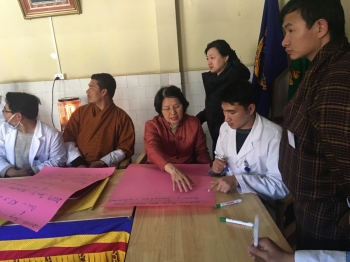Palliative Care in Asia: inequality analysis

Vatican City, April 24. The Pontifical Academy for Life reiterates the need for widespread palliative care throughout the world. On the occasion of the publication of the APHN Atlas of Palliative Care in the Asia Pacific Regions 2025, the first study on the situation in 41 countries and areas in the region, H.E. Mgr. Vincenzo Paglia, President of the Pontifical Academy for Life, notes that "it is necessary to promote a palliative culture, which is a culture of care, both to respond to the temptation that comes from euthanasia and assisted suicide, and above all to bring to maturity as widely as possible the culture of caring for others that allows us to offer closeness and compassion until the end of life. In this way, we respond to and reject the temptation of euthanasia, which takes hold when the sick person is afraid of pain and loneliness. My hope is that we can help bring about greater attention to palliative care on the part of everyone, starting with believers of all religious denominations.”
The Report published today notes that more than 70% of specialist palliative care services in the Asia-Pacific region are concentrated in less than 15% of the countries and areas that make up the region: Australia, Malaysia, Japan, South Korea, Thailand, and New Zealand. This is shown by the APHN Atlas of Palliative Care in the Asia Pacific Regions 2025, the first study on the situation in 41 countries and areas in the region, promoted by the ATLANTES Global Observatory of Palliative Care of the Institute for Culture and Society (ICS) of the University of Navarra in collaboration with the Asia Pacific Hospice Palliative Care Network (APHN). This pioneering research was presented on Thursday April 24 at the 16th Asia Pacific Hospice Palliative Care Conference 2025 in Kuching, Malaysia and provides a comprehensive snapshot of palliative care in Asia and the Pacific regions, home to 4.3 billion people.
In 2017, the Pontifical Academy for Life launched the PAL-LIFE Project, which has resulted so far in the publication of a White Paper on the Dissemination and Promotion of Palliative Care throughout the world, translated into several languages. Through this initiative and through various conferences held in recent years in Europe, North America, Africa, Asia, and Latin America, the Pontifical Academy for Life has sought to take seriously the human and social challenge posed to all of us today by the fragility of old age, of serious or terminal illness, offering itself as a scientific and cultural partner for communities, such as that of palliative medicine, which are deeply committed, with all the intelligence of the mind and with all the compassion of the heart, to finding worthy responses for a humanity deeply in need.
Vatican City, 24 April 2025
(Photo: Teaching Palliative Care in Bhutan. Source: Atlantes, Navarra University, Spain)



